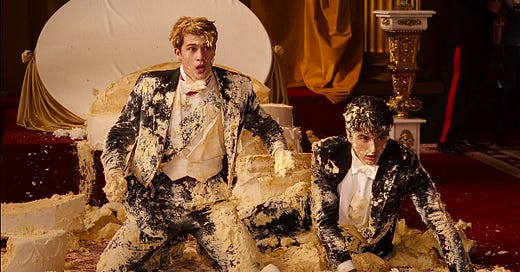“Red, White & Royal Blue” Is Not Revolutionary For Being Mediocre
Is marketability the final goal of liberation?
Hollywood has never been more dystopian than it is right now — thousands of workers essential to the industry striking not only for the right to fair compensation, but the right to their own likeness, while their employers reap billions from films which are little more than nostalgia-driven merchandising ploys. Red, White & Royal Blue contributes greatly to the upsetting state of mass entertainment. I was certain the film would be consistently recognized as a complete failure by nearly every creative metric, but I was shocked to see it met with consistent praise because of its utter laziness. Critic Coleman Spilde laments that prior to the film, no queer movies could “let themselves just be, well, movies,” but Red, White & Royal Blue was, refreshingly, “a gay movie that is unconcerned with its own manufactured notability, a movie satisfied with its central queer characters having no substance at all.”
His comments are slightly tongue-and-cheek, but they reflect a real sentiment. Because the film is so seemingly content with its complete lack of substance, it is therefore notable because it is the equalizer for queer filmmaking — trashy, lazy, shallow gay cinema is here for us at last. But Red, White & Royal Blue’s praise because of its complete lack of notability may tread dangerous territory for the future of artistically-minded filmmaking.
The film follows Alex (Taylor Zakhar Perez), the son of a populist liberal president (Uma Thurman), who must fake a political friendship with Britain’s Prince Henry (Nicholas Galitzine), after the tabloids become obsessed with an altercation at a royal event. However, their staged truce turns into actual romance once they uncover the pointless root of their hatred, and they both must grapple with the potential political ramifications if their relationship goes public.
The only genuinely intriguing aspect of the film is the connection the two protagonist’s share over their entirely ornamental status. Henry is coming to terms with the solely ceremonial purpose of the royal family (though the imperial ramifications of monarchy are ignored), while Alex wants to become involved in real political action, rather than simply serve as window dressing for photo ops. Alex, who comes from a working class background, realized that he has become one of the privileged elites he loves shaking his fist at, while Henry desperately wants to escape that same status, which was assigned to him at birth. These concepts could be fodder for a thoughtful romance, but they are shoehorned in and overshadowed by awkward sex scenes and sleek montages, and are never given a second thought.
Additionally, in a film politically loaded from the start, director Matthew López seems to disregard any discussion of politics entirely. There are vague mentions of international trade deals and electoral disputes, but the vacant political thesis of the movie is reflective of the time the story was conceptualized. It is a Clinton voter’s Trump-era fantasy, in which the problem lies not in our institutions, but simply with those who occupy them. In the film’s fictional America run by Democrats, the country’s biggest issue is simply trying to get them re-elected.
Red, White & Royal Blue’s vacuous political thesis is exemplified by the story’s completely unengaging pacing. In just over twenty minutes, the only genuinely enticing conflict of the film — a forced political friendship despite genuine hatred masking sexual tension — is completely resolved. The only real remaining intrigue is the threat of their secret being revealed, which the film eschews in favor of montages designed to cut together any semblance of chemistry between the leads. The ill-advised pace of the film allows the plot to come to a grinding halt after the first half hour, and only ever start moving again during the last few minutes of its two hour runtime.
Since the poor pacing butchers the film beyond repair, the denouement arrives as a relief to an agonizing third act. But surprisingly, the conclusion undermines the moral resolution to which the film is slowly building. For the entire film, Alex wants to be involved politically in his mother’s campaign, and he pushes back against his parents who use him to promote their image. But during the denouement, the film frames his coming out, rather than his political contributions, as the turning point in the neck-and-neck election. Alex is somehow content with his queerness being manipulated for campaign-saving election optics, despite his life-long fight to be more than just an image. He becomes satisfied with his own marketability, happy to allow his identity to become another facet of his image-based appeal to the world.
Unfortunately, Red, White & Royal Blue outlines a potentially dangerous trajectory for the film industry. At a time where actual creatives are being subjugated by their own industry, collective praise of Red, White & Royal Blue sets a dangerous standard for movies. Lauding it as revolutionary simply because it levels the playing field by embracing a mediocre gay love story will reinforce the idea that that studios can use lazy and insubstantial filmmaking to milk queerness for all its worth. This standard leads studios to believe that proper LGBTQ+ representation is not signified by respectful storytelling, but simply by reaching the same level of marketability as its heterosexual counterparts. And at a time when studios are praying for the success of writerless, AI-generated garbage, mass endorsement of soulless, pandering, and one-dimensional films poses a threat to actual creatives. Red, White & Royal Blue sets a dangerous standard — poorly written, lazy, and forgetful media is valuable (and still profitable) as long as it wields minority representation as a shield against criticism.
OVERALL SCORE: 1/10
Red, White & Royal Blue was released on August 11 and is currently streaming on Amazon Prime.





Thanks for saving me some time. Onward to the next new release ...
this really woke me up. Hillary should have won tbh